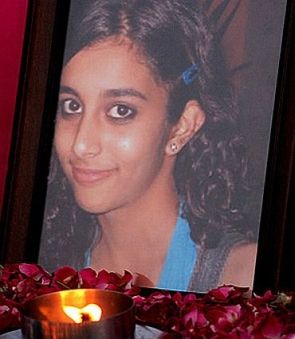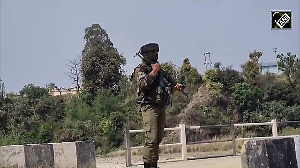 While readying the judgement in the Aarushi-Hemraj double murder case, special CBI Judge Shyam Lal had to bank on his lawyer son's typing skills since he had trouble finding a stenographer who could type in English.
While readying the judgement in the Aarushi-Hemraj double murder case, special CBI Judge Shyam Lal had to bank on his lawyer son's typing skills since he had trouble finding a stenographer who could type in English.
This and several other titbits related to the murder mystery that shook the nation find mention in a new book ‘Aarushi’ by Avirook Sen.
The book goes beyond the murder trial and is a commentary on how justice and investigation are carried out in India. It is based on the trials and interviews the author had with various people related to the case.
On November 25, 2013, Judge Shyam Lal holds Aarushi's parents Deepak and Nupur Talwar guilty. They were sentenced to life imprisonment the next day. They are now in Dasna jail in Uttar Pradesh. Their appeal is pending in the Allahabad high court.
When the author asked the now-retired judge how long it takes to write a page, he answered, "One page? Ten minutes, maximum. Only ten minutes."
"Lal's lawyer son Ashutosh, then added, 'But the situation was different in the Aarushi case...We had to use some good words in the judgement ... We have to go through that page again and again, so there is no mistake. So it took some time'," the book says.
"Ashutosh continued: 'The difficulty was finding a typist. Because, you know, in Ghaziabad all typists are for Hindi only. Only one or two stenos are there who can type the judgements in English. We had to make special arrangements. In fact I was the one who typed the beginning personally. First ten pages'," it says.
The judgement was 210 pages and it took more than to month to write.
"I took this information in, and did my best to appear deadpan. Because the facts were these: Judge Shyam Lal pronounced his judgement on November 25, 2013. Tanveer Ahmed Mir, counsel for the defence, began his final arguments on October 24. Over the next two weeks he would argue on a total of 24 circumstances that he felt should lead to acquittal.
"Seven of these were major points. As Judge Shyam Lal and his son sat down to write the judgement, Mir (the Talwars' lawyer Tanveer Ahmed Mir) had not even begun. The Talwars and Mir had their own stenographer-related problems and would submit the arguments in writing only around 10 November.
(Their typist was also a kabab seller who had got busy with his food business in the festive season.)," the book, published by Penguin, says.
"At each hearing Judge Shyam Lal would urge Mir to do two things: wrap up quickly and submit the written arguments. As Mir soldiered on, neither he nor the Talwars would have known the fruitlessness of their exercise. Ashutosh was right; the guilty verdict was already being worked on. Shyam Lal after a brief while mumbled: ‘No, no . . . about a fortnight, not a month’.”
"But by then, his son had given too many details away: his trip to Ghaziabad, that he typed out the first ten pages himself as they tried to make special arrangements for a typist, the requirement for 'good words' which took time," the author says.
According to Sen, the defence arguments were not fully heard and there were glitches in the CBI investigations in the case. He also claims that there might have been tutoring and possible blackmail of some key witnesses.
The book is divided into three parts -- the investigation, the trial and the Dasna diaries, which speak of the Talwars' lives in jail.










 © 2025
© 2025